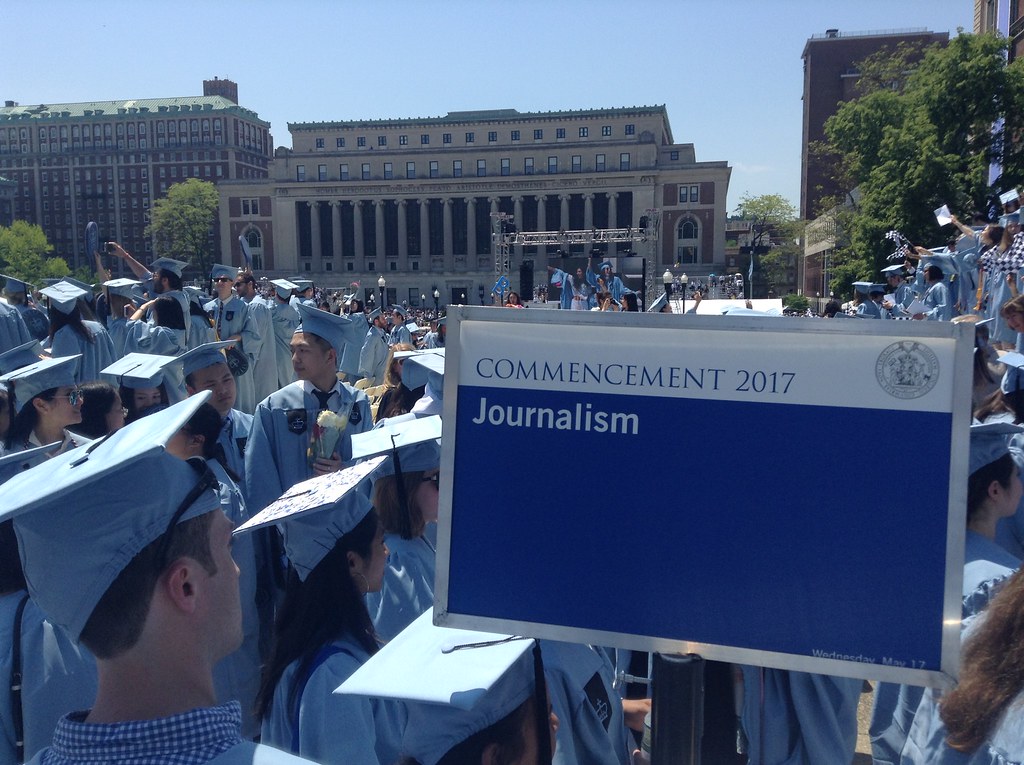Would it be inappropriate to play with the Wogdon pistols that Alexander Hamilton and Aaron Burr used in their famous 1804 duel? Not that I exactly played with the guns, which are enclosed in a glass case on one of the upper floors of the J.P. Morgan Chase skyscraper in Manhattan. Doug and I just posed playfully with them last month:

We were at the bank headquarters to have dinner with J.P. Morgan’s chief executive, Jamie Dimon, which marked the final event of the Knight-Bagehot Fellowship in Economics and Business Journalism that we and eight other journalists participated in during the 2016-2017 school year at Columbia University. The dinner was off-the-record, but I think I can say that Dimon didn’t seem to mind us taking a selfie with the old guns.
Coincidentally, the fellowship year had begun with the 10 of us posing outside Columbia Graduate School of Journalism in front of the statue of Thomas Jefferson, who happens to have a supporting role in the Hamilton-Burr duel. (There’s some irony in a statue of Jefferson being outside the school of journalism, an institution that he felt ambivalent toward. Before becoming president, Jefferson famously said, “The only security of all is in a free press.” But once president, he said: “Nothing can now be believed which is seen in a newspaper. Truth itself becomes suspicious by being put into that polluted vehicle.”)

In the U.S. presidential election of 1800, Hamilton orchestrated a political plot whereby Burr lost to Jefferson and instead became Jefferson’s vice president. Later, Hamilton campaigned so Burr also lost the vote to become governor of New York State, which pushed Burr over the edge; he promptly challenged Hamilton to a shoot-off. Burr won, perhaps becoming the only sitting U.S. vice-president to be guilty of murder until the character Frank Underwood in the Netflix series House of Cards.
Hamilton was the first U.S. Treasury Secretary. While he was a bit before our time, we Knight-Bagehot Fellows were able to have a steak dinner with 70th secretary of the U.S. Department of the Treasury, Robert Rubin. We also had wine with Paul Volcker (pictured below), the 12th president of the U.S. Federal Reserve for which Hamilton laid the foundations 200 years ago.

It is appropriate that Volcker stand 6 feet 7 inches tall, because he’s a looming figure in U.S. economics, having taken the U.S. off gold standard in 1971 and then tackling rampant national inflation (a time when average bank loans were well into the double-digit figures of shark lenders).
Volcker was grandfatherly, repeating his often-said jest that the only useful banking invention in recent years has been the invention of the ATM. “His demeanour certainly hails from another era: he refuses to use e-mail, writes longhand (or dictates to Ms Dening) and his hearing aid works imperfectly,” The Financial Times’ manager editor Gillian Tett has written of Volcker. Tett herself met with us, too:

We met with these business and economic gurus — among dozens of other media leaders like Steve Coll and Ben Smith — because the idea of the Knight-Bagehot Fellowship is to make a few of us journalists better at reporting on matters of business and economics. I’m not exactly sure how joking around with the Hamilton-Burr pistols will make me a better journalist, but I suppose the experience had a similar value to meeting with Volcker — a chance to interact with history and better understand how the past intersects with the present.
The fellowship is named after Knight, as in the John S. and James L. Knight Foundation that supports journalism projects and fellowships nationwide, and Bagehot (pronounced “badge – ot”), as in the pioneering British business journalist Walter Bagehot who helped found The Economist.
More than once I had to explain this etymology, sometimes to a bemused look followed by the question, “You’re a night badger?” When I clarified the fellowship’s title to a respected editor who was speaking at Pulitzer Hall, he responded: “You’re in the Fellowship of the Knight-Badgers? Are you also attending Hogwarts School of Witchcraft and Wizardry?” Almost.


